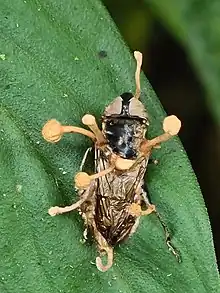Ophiocordyceps dipterigena
Ophiocordyceps dipterigena is an entomopathogenic fungi species from the genus Ophiocordyceps.[1] This species was originally described in 2007.
| Ophiocordyceps dipterigena | |
|---|---|
 | |
| Scientific classification | |
| Domain: | Eukaryota |
| Kingdom: | Fungi |
| Division: | Ascomycota |
| Class: | Sordariomycetes |
| Order: | Hypocreales |
| Family: | Ophiocordycipitaceae |
| Genus: | Ophiocordyceps |
| Species: | O. dipterigena |
| Binomial name | |
| Ophiocordyceps dipterigena (Berk. & Broome) G.H.Sung, J.M.Sung, Hywel-Jones & Spatafora | |
Description
Other entomopathogenic fungi manipulate their hosts by making the fly look for the part of the plant where the stem is, and then the fly hangs itself by its legs. This hanging behavior seems to help the fungus grow and develop. O. dipterigena manipulates its host to land on a leaf without needing to hang itself. In this particular species, once the fly dies, a part of the fungus grows out from inside the insect through its head, resembling its antennae.[2] The stroma of O. dipterigena is yellow.
Ecology
Ophiocordyceps dipterigena might be considered as a potential candidate for the biological control of Agromyzid flies, opening new possibilities for the use of entomopathogenic fungi in biological control programs.[5]
References
- Gi-Ho Sung; Nigel L Hywel-Jones; Jae-Mo Sung; J Jennifer Luangsa-Ard; Bhushan Shrestha; Joseph W Spatafora (1 January 2007). "Phylogenetic classification of Cordyceps and the clavicipitaceous fungi". Studies in Mycology. 57: 5–59, iii. doi:10.3114/SIM.2007.57.01. ISSN 0166-0616. PMC 2104736. PMID 18490993. Wikidata Q24683409.
- Bruno Corrêa Barbosa; Mariana Paschoalini; Fábio Prezoto; Tatiane Tagliatti Maciela (2016). "Entomopathogenic Fungi in Diptera: remarks on range extension and collection records". Boletim do Museu de Biologia Mello Leitao. ISSN 0103-9121. Wikidata Q118358958.
- Attawit Kovitvadhi; Pipatpong Chundang; Chanin Tirawattanawanich; Wai Prathumpai; Pawadee Methacanon; Krith Chokpipatpol (7 March 2019). "Effects of dietary supplementation with different levels and molecular weights of fungal β-glucan on performances, health and meat quality in broilers". Asian-Australasian Journal of Animal Sciences. 32 (10): 1548–1557. doi:10.5713/AJAS.18.0927. ISSN 1011-2367. PMC 6718905. PMID 31010987. Wikidata Q90213822.
- Wai Prathumpai; Pranee Rachtawee; Sutamat Khajeeram; Pariya Nakorn (31 March 2017). "Optimization and Scale-up of Extracellular b-glucan Production by Ophiocordyceps dipterigena BCC 2073 in Low-Cost Media". Journal of Pure and Applied Microbiology. 11 (1): 51–62. doi:10.22207/JPAM.11.1.08. ISSN 0973-7510. Wikidata Q118358941.
- Geraldo Salgado-Neto; Priscila Andre Sanz-Veiga; Marcos André Braz Vaz (11 May 2018). "First record of Ophiocordyceps dipterigena (Ascomycota: Hypocreales: Ophiocordycipitaceae) infecting adults of Melanagromyza sojae (Diptera: Agromyzidae) in Brazil". Ciência Rural (in English and Portuguese). doi:10.1590/0103-8478CR20170637. ISSN 0103-8478. Wikidata Q118358901.